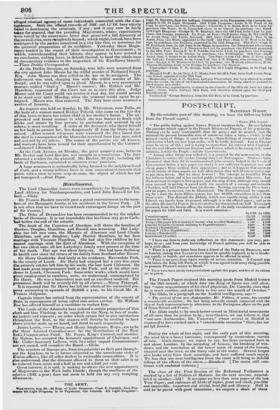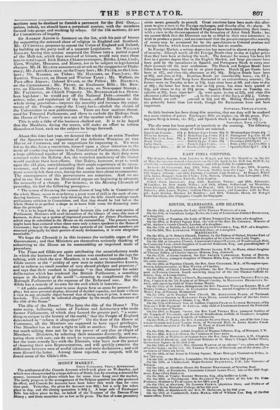The close of the First Session of the Reformed Parliament
is marked by a list of Notices of Motions for the next session, unparal- leled in number-134! It occupies no less than nine pages of the last. Vote Paper; and embraces all kinds of topics, great and small, possible and impossible, important and trivial, bond fide and illusory. Hell is said to' be paved with good intentions; we suspect a share of these
motions. maybe-destined to furnish a pavement- for the Evil One,— • unless, indeed, we should have a-perpetual session; with the members formed into gangs and working by relays. Of the 134 motions, 25 are for Committees of.inquiry.
Sir ANDREW AGNEW■is foremost on the list; with his pair of braces for supporting the outward show of religion in England and. Scotland. Mr. O'CONNELL proposes to.cerneat the Union of England and Ireland, by building up the party-wall of a separate Legislature. Sir WILLIAM INGILBY, having this session surprised the House into a partial repeal of the Malt-tax, which they reversed at leisure, would now warn them into its total repeal. Irish Butter, Chiinneysweepers, Bricks, Lime, Coals, • Corn, Weights, Measures, and Money, are to be subject to legislatorial changes. Mr. H. BULWER announces an atrack on the snuggeries of Diplo- macy; Mr. JAMES KENNEDY. on the Usury laws ; Mr. FRYER, on the Corn- laws ; Mr. BARRON, on Tithes; Mr. HALCOMB, on Poor-laws; Sir SAMUEL WHALLEY, on House and Window Taxes ; Mr. Wallace, on Post-office Abuses ; Colonel EvAms, on the Police; Mr. HANDLEY, on the Customhouse ; Mr. PRYME, on Enclosure Bills ; Mr. BEN- ETT, on Election Bribery; Mr. E. BULWER. on Newspaper. Stamps ; Mr. FAITHFULL, on Church Property. Mr. BUCKINGHAM is a Hercu- lean legislator : he would pay off the National Debt—remodel the orders, rules, and regulations of the House—afford Education to the whole rising generation—improve the morality and-increase the enjoy- ments of the People—repeal the Usury-laws—abolish the claims of the Universities to new publications. There are four motions threat- ened for Triennial Parliaments, and three to exclude the Bishops from the House of Peers : surely one out of the number will take effect.
This is only a tithe of the business chalked out. It is to be hoped that the Members, during the recess, will make an • effort to inform themselves at least, each on the subject he brings forward.

















 Previous page
Previous page